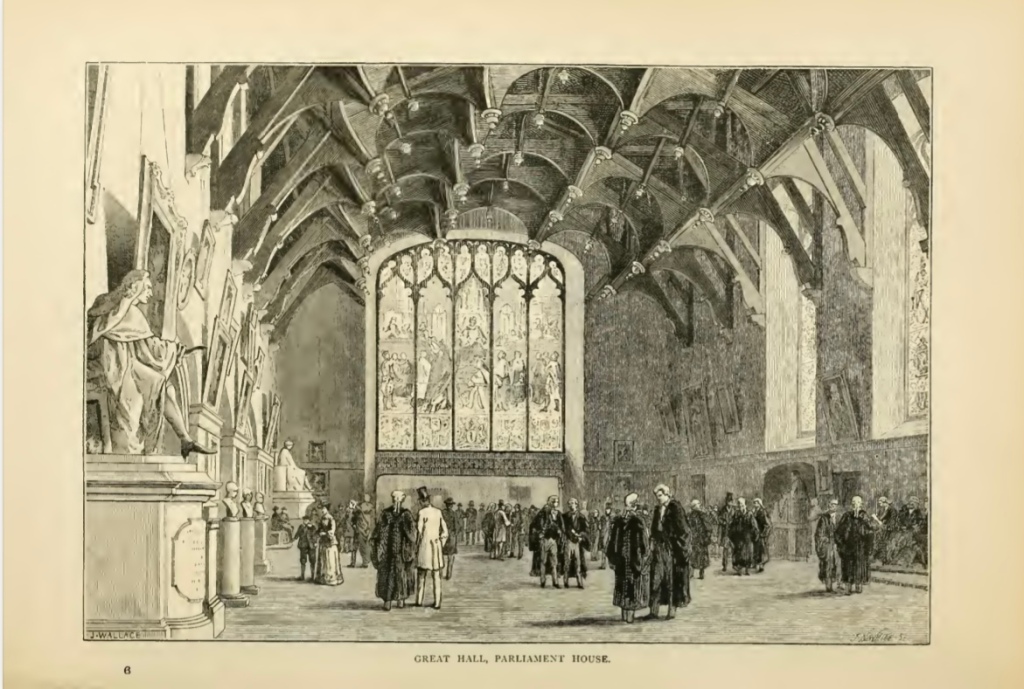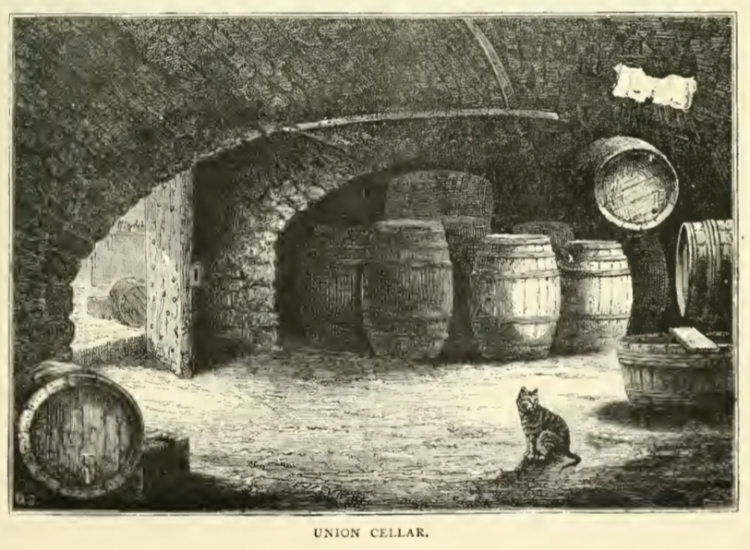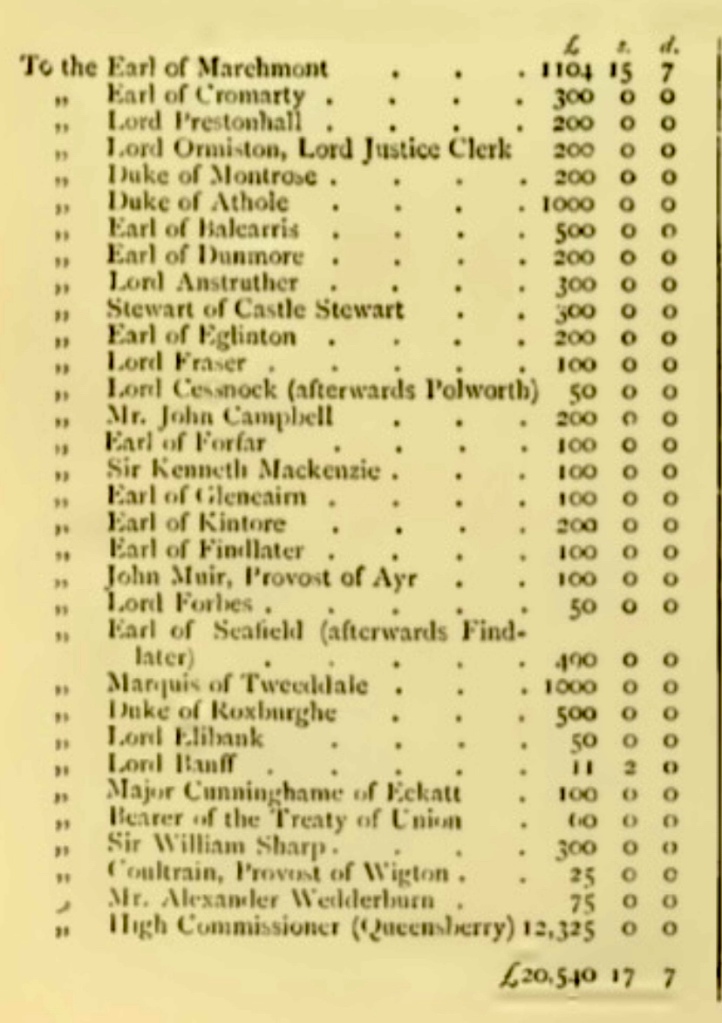
“English bribes outweighed the mistaken zeal of Scottish patriotism and Jacobitism, united against the measure.
“On the 25th of March, 1707, the treaty or union was ratified by the Estates, and on the 22nd of April the ancient Parliament of Scotland adjourned, to assemble no more. On that occasion the Chancellor Scofield made use of a brutal jest, for which, says Sir Walter Scott, his countrymen should have destroyed him on the spot.
“It is, of course, a matter of common history that the legislative union between Scotland and England was carried by the grossest bribery and corruption; but the sums actually paid to members who sat in that last Parliament are not perhaps so well known, and may be curious to the reader.
“During some financial investigations which were in progress in 1711 Lockhart discovered and made public that the sum of £20,540 17s. 7d. had been secretly distributed by Lord Godolphin, the Treasurer of England, among the baser members of the Scottish Parliament, for the purpose of inducing them to vote for the extinction of their country, and in his, “Memoirs of Scotland from the Accession of Queen Anne”, he gives us the following list of the receivers, with the actual sum which was paid to each, and this list was confirmed on oath by David Earl of Glasgow; the Treasurer Deputy.
Earl of Marchmont : £1104 15s. 7d.
Earl of Cromarty : £300
Lord Prestonhall : £200
L.ord Ormiston, Lord Justice Clerk : £200
Duke of Montrose : £200
Duke of Athole : £1,000
Earl of Balearris : £500
Earl of Dunmore : £200
Lord Anstruther : £300
Stewart of Castle Stewart : £300
Earl of Eglinton : £200
Lord Fraser : £100
Lord Cessnock (afterwards Polworth) : £50
Mr. John Campbell : £200
Earl of Forfar : £100
Sir Kenneth Mackenzie : £100
Earl of Clencairn : £100
Earl of Kintore : £200
Earl of Findlater : £100
John Muir, Provost of Ayr : £100
Lord Forbes : £50
Earl of Seafield (afterwards Findlater) : £490
Marquis of Tweeddale : £1000
Duke of Roxburghe : £500
Lord Elibank : £50
Lord Banff : £11 2s.
Major Cunninghame of Eckatt : £100
Bearer of the Treaty of Union : £60
Sir William Sharp : £300
Coultrain, Provost of Wigton : £25
Mr. Alexander Wedderburn : £75
High Commissioner (Queensberry) : £12,325
In all: £20,540 17s. 7d. [the equivalent of at least £6 million in 2024]
“The corrupt state of the Scottish peerage can scarcely excite surprise when we find that, according to Stair’s Decisions, Lord Pitsligo, but a few years before this, purloined Lord Coupar’s watch, they at the time “being sitting in Parliament!”
“Under terror of the Edinburgh mobs, who nearly tore the Chancellor and others limb from limb in the streets, one half of the signatures were appended to the treaty in a cellar of a house, No 177, High Street, opposite the Tron Church, named “the Union Cellar“; the rest were appended in an arbour which then adorned the Garden of Moray House in the Canongate; and the moment this was accomplished, Queensberry and the conspirators — for such they really seem to have been — fled to England before daybreak, with the duplicate of the treaty.

“A bitter song, known as “The Curses,” was long after sung in every street.
“Curs’d be the Papists who withdrew,
The king to their persuasion:
Curs’d be the Covenanting crew
Who gave the first occasion.
“Curs’d be the wretch who seized the throne,
And marred our Constitution ;
And curs’d be they who helped on
That wicked Revolution.
“Curs’d be those traitorous traitors who
By their perfidious knavery,
Have brought our nation now unto
An everlasting slavery.
Curs’d be the Parliament that day,
Who gave their confirmation;
And cursed be every whining Whig,
For they have damned the nation !”
“We have shown what the representation of Scotland was, in the account of the Riding of the Parliament. By the Treaty of Union the number was cut down to sixty-one for both Houses, and the general effects of it were long remembered in Scotland with bitterness and reprehension, and generations went to their grave ere the long-promised prosperity came. Ruin and desolation fell upon the country ; in the towns the grass grew round the market-crosses ; the east coast trade was destroyed, and the west was as yet undeveloped ; all the arsenals were emptied, the fortresses disarmed, and two royal palaces fell into ruin.
“The departure of the king to London in 1603 caused not the slightest difference in Edinburgh ; but the Union seemed to achieve the irreparable ruin of the capital and of the nation. Of the former Robert Chambers says :—
“From the Union, up to the middle of this century, the existence of the city seems to have been a perfect blank ! No improvements of any sort marked the period. On the contrary, an air of gloom and depression pervaded the city, such as distinguished its history at no former period. A tinge was communicated even to the manners and fashions of society, which were remarkable for stiff reserve, precise moral carriage, and a species of decorum amounting almost to moroseness, sure indications, it is to be supposed, of a time of adversity and humiliation … In short, this may be called, no less appropriately than emphatically, the dark age of Edinburgh.”
“Years of national torpor and accepted degradation followed, and to the Scot who ventured south but a sorry welcome was accorded; yet from this state of things Scotland rose to what she is to-day, by her own exertions, unaided, and often obstructed…”
from Cassells Old and New Edinburgh Vol. 1 (published ca 1880)

By their perfidious knavery,
Have brought our nation now unto
An everlasting slavery.“